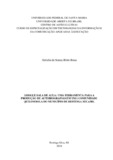| dc.contributor.advisor | Cecchin, Anidene de Siqueira | |
| dc.creator | Rosa, Adriela de Souza Brito | |
| dc.date.accessioned | 2019-01-16T15:00:16Z | |
| dc.date.available | 2019-01-16T15:00:16Z | |
| dc.date.issued | 2018-11-30 | |
| dc.date.submitted | 2018 | |
| dc.identifier.uri | http://repositorio.ufsm.br/handle/1/15379 | |
| dc.description | Artigo (especialização) - Universidade Federal de Santa Maria, Centro de Artes e Letras, Curso de Especialização em Tecnologias da Informação e da Comunicação Aplicadas à Educação, EaD, RS, 2018. | por |
| dc.description.abstract | Technologies have emerged in the world with a forceful advance, bringing to society numerous benefits, understood as a true instrument of evolution. In relation to education, they have generated changes in the school context. In this sense, this article aims to report pedagogical practices of reading and production of autobiography in a school context, using Google classroom. The work was carried out from a qualitative approach in a case study. In order to subsidize this work, we carried out researches related to the study of Portuguese Language (Motta-Roth, 2006; BRASIL, 2017) on the textual genre autobiography and textual production. Consequently, the didactic sequence (DOLZ et al.2004) together with Information and Communication Technologies, Virtual Learning Environments and the Production of Didactic Material (REIS; GOMES, 2014,2018). For the development of the process was organized a didactic sequence of reading and production of autobiographies in the form of a workshop, with students of the 8th and 9th grade of Elementary School.From the results obtained, it is possible to infer that Google Classroom assists in the interaction between the subjects, and the resources of the Drive corroborate to the practice of reading and writing in the school context, as it makes possible the accomplishment of interactive and engaging practices for the students and it was verified that the organization of a curricular matrix helps the work of the teacher. | eng |
| dc.language | por | por |
| dc.publisher | Universidade Federal de Santa Maria | por |
| dc.rights | Acesso Aberto | por |
| dc.rights | Attribution-NonCommercial-NoDerivatives 4.0 International | * |
| dc.rights.uri | http://creativecommons.org/licenses/by-nc-nd/4.0/ | * |
| dc.subject | TICs (Tecnologias de Informação e Comunicação) | por |
| dc.subject | Google sala de aula | por |
| dc.subject | Leitura e escrita | por |
| dc.subject | Information and communication technologies | eng |
| dc.subject | Google classroom | eng |
| dc.subject | Reading and writing | eng |
| dc.title | Google sala de aula: uma ferramenta para a produção de autobiografias em uma comunidade quilombola do município de Restinga Seca/RS | por |
| dc.title.alternative | Google classroom: a tool for the production of autobiographies in a quilombola community of the Restinga Sêca/RS municipality | eng |
| dc.type | Trabalho de Conclusão de Curso de Especialização | por |
| dc.degree.local | Polo de Restinga Sêca, RS, Brasil | por |
| dc.degree.specialization | Tecnologias da Informação e da Comunicação Aplicadas à Educação, EaD | por |
| dc.description.resumo | Technologies have emerged in the world with a forceful advance, bringing to society numerous benefits, understood as a true instrument of evolution. In relation to education, they have generated changes in the school context. In this sense, this article aims to report pedagogical practices of reading and production of autobiography in a school context, using Google classroom. The work was carried out from a qualitative approach in a case study. In order to subsidize this work, we carried out researches related to the study of Portuguese Language (Motta-Roth, 2006; BRASIL, 2017) on the textual genre autobiography and textual production. Consequently, the didactic sequence (DOLZ et al.2004) together with Information and Communication Technologies, Virtual Learning Environments and the Production of Didactic Material (REIS; GOMES, 2014,2018). For the development of the process was organized a didactic sequence of reading and production of autobiographies in the form of a workshop, with students of the 8th and 9th grade of Elementary School.From the results obtained, it is possible to infer that Google Classroom assists in the interaction between the subjects, and the resources of the Drive corroborate to the practice of reading and writing in the school context, as it makes possible the accomplishment of interactive and engaging practices for the students and it was verified that the organization of a curricular matrix helps the work of the teacher. | por |
| dc.publisher.country | Brasil | por |
| dc.publisher.initials | UFSM | por |
| dc.subject.cnpq | CNPQ::CIENCIAS HUMANAS::EDUCACAO | por |
| dc.publisher.unidade | Centro de Artes e Letras | por |



